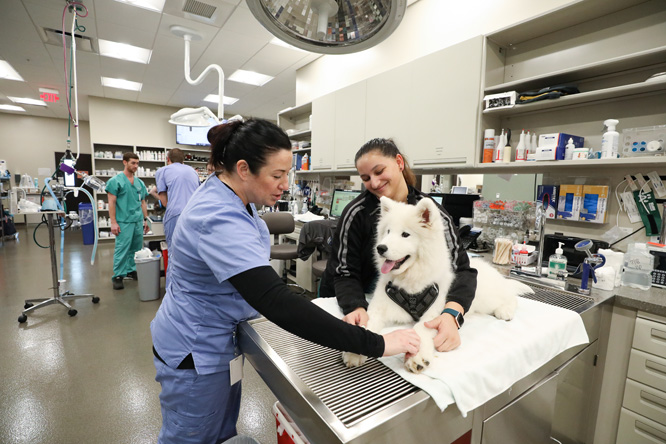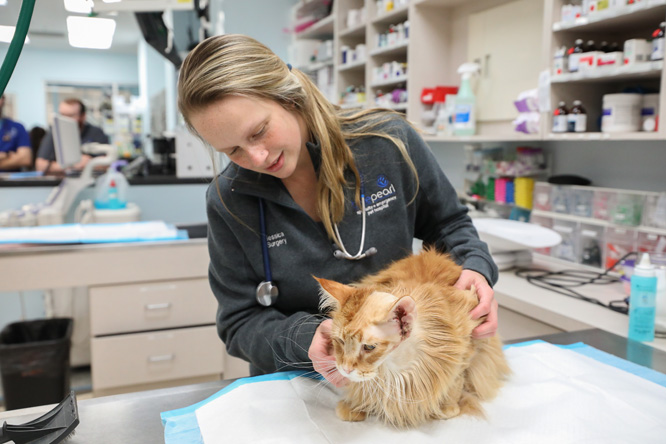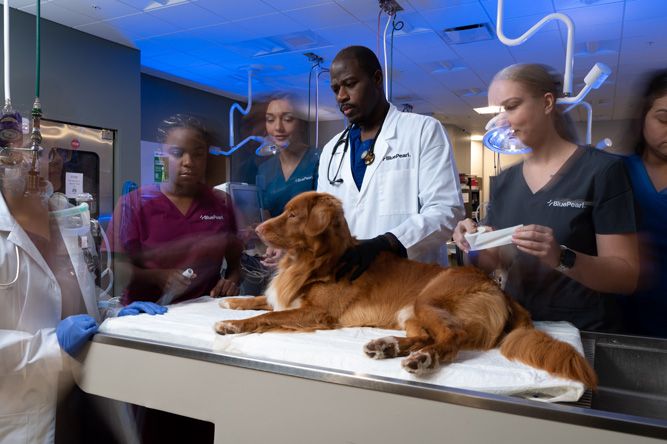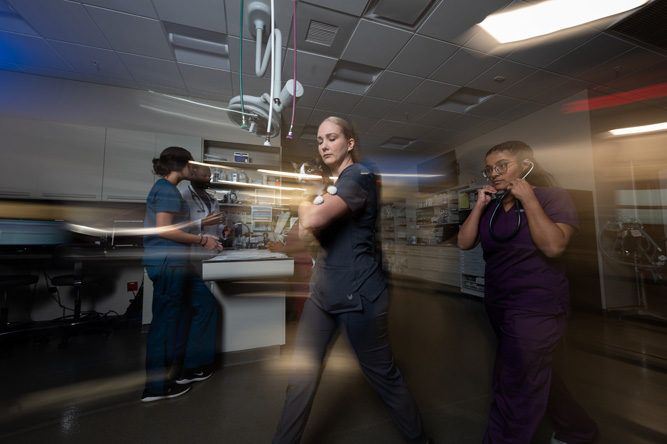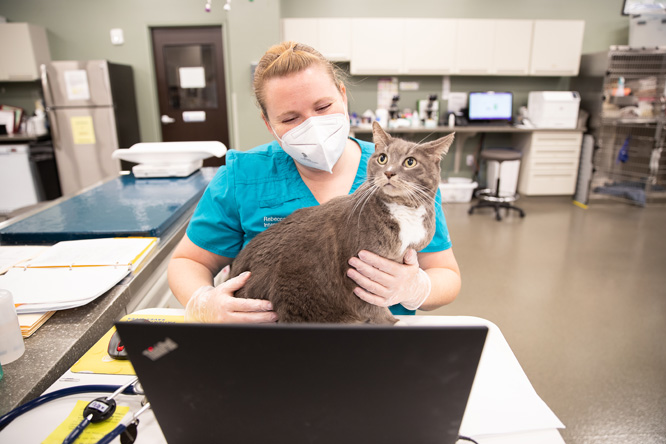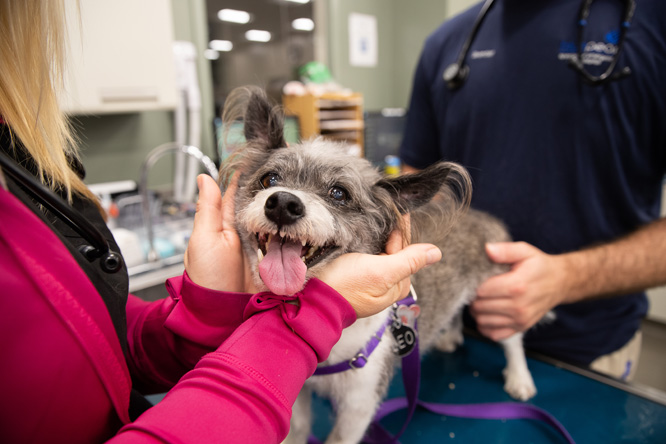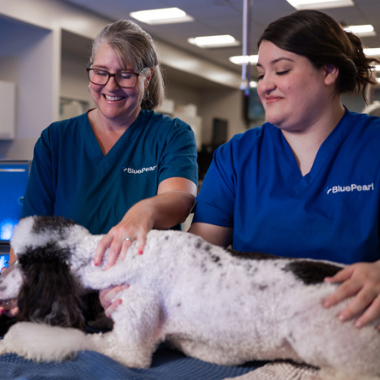Pet emergency medicine by BluePearl.
Pet emergencies can be scary – we’re here to help you handle them.
We understand that seeing your pet sick, hurt or in distress can be stressful – especially if you don’t know what’s wrong. Fortunately, our experienced ER clinicians are prepared to take action and help.

Common pet emergencies.
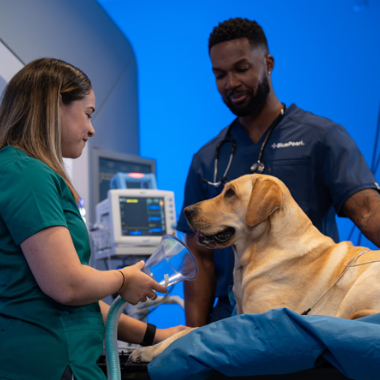
Acting quickly in an emergency may save your pet’s life.
If your pet is experiencing an emergency, you’ll have an entire veterinary team helping them so you can get back to what matters most – spending precious moments together.
- Accidents, injuries and trauma (hit-by-car, animal attacks, etc.)
- Bleeding
- Bloat (gastric dilatation volvulus, or GDV)
- Collapse or unresponsiveness
- Complications from chronic diseases
- Difficulty breathing
- Straining to urinate
- Ingestion of medications, poisons or objects
- Seizures
- Vomiting and diarrhea
Our emergency team.
Experience makes all the difference.
Our emergency team is made up of veterinarians, vet technicians and assistants, and support staff with rigorous training and experience in specialty medicine. The team works hand in hand to provide the comprehensive, compassionate care your pet needs and deserves. Because we’re a multidisciplinary hospital, the team can consult the expertise of other specialty departments, too.
Jacob Adkins
DVMDr. Jake Adkins finds wound repair and care especially gratifying. His professional interests include toxicology, radiology and ultrasonography.
- Doctor of Veterinary Medicine, Mississippi State University, Starkville
- Bachelor of Science, Wildlife, Fisheries and Aquaculture, Mississippi State University, Starkville
Dr. Adkins enjoys spending time with his wife and their dog, a white German shepherd named Naklin. In his free time, he enjoys hunting, fishing, golfing, disc golfing and cooking.
Mary Beth Hannon
DVM, CVA- Certified Veterinary Acupuncturist, Chi Institute, Reddick, FL
- Doctor of Veterinary Medicine, Cornell University, Ithaca, NY
- Bachelor of Science, Animal Science, Cornell University, Ithaca, NY
Michael Brandt Tolbert
DVMBorn and raised in Birmingham, Alabama, Dr. Brandt Tolbert discovered his interest in veterinary medicine at a young age. After graduating from vet school, he spent the first 15 years of his career in general practice. Then, in 2014, an opportunity arose in emergency veterinary medicine and Dr. Tolbert has spent the majority of his career in the ER ever since. He has a special interest in toxicology and enjoys the unique challenges of these cases.
- Doctor of Veterinary Medicine, Auburn University, AL
- Bachelor of Science, Zoology, Auburn University, AL
Dr. Tolbert lives with his wife and three children. At home, they have a pit bull, four cats, and an ever-varying number of foster cats.
Austen Vollenweider
DVM- Doctor of Veterinary Medicine, Virginia Polytechnic Institute and State University, Blacksburg
- Bachelor of Science, Animal Sciences, Auburn University, AL
What to expect.
We know an unexpected trip to the emergency pet hospital can be stressful, and we want you to be prepared so you have one less thing to worry about. Our entire BluePearl team will be with you every step of the way.
Before your visit
- If possible, call us before arriving so we can discuss your pet’s condition, help you with directions and prepare our team.
- Collect your pet’s medical records, current medication or any historical information.
- If your pet has eaten something potentially toxic, bring the substance with you if it’s safe to do so.
During your visit
- When you arrive, let us know if you need help bringing your pet in from the car, and we’ll be ready to assist you.
- Our team will perform an initial triage exam on your pet to assess their condition.
- To stabilize your pet, we may need to administer IV fluids, pain medications, oxygen therapy and sometimes blood or plasma transfusions.
- Before you leave, you’ll receive discharge instructions and a list of any recommended medications.
After your visit
- We’ll let your family veterinarian know about your pet’s condition and the treatment they receive at BluePearl. This communication is key in the ongoing management of your pet’s care.
- You know your pet better than anyone, and you play a crucial role in any follow-up treatment necessary. If you have any concerns about providing care at home (such as giving medication or monitoring your pet’s symptoms), let us know – we’re here for you.
